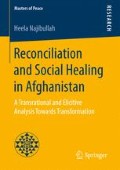Abstract
In the concluding chapter of my book, I answer my research question how can the peace initiatives in Afghanistan bring sustainable reconciliation by converging the main points of my research i.e. the unique geopolitical situation of Afghanistan and the lessons from the NRP for the current APRP or future reconciliation processes. I emphasize once again the importance of social healing to reach reconciliation in Afghanistan involving communities through a web approach. I believe that sustainable reconciliation in Afghanistan can be achieved when the process becomes people centric, multi-layered and in parallel to the national focus there is an effort to build consensus amongst competing regional and global powers. In addition, I briefly reflect at my own transformation while writing this book.
Access this chapter
Tax calculation will be finalised at checkout
Purchases are for personal use only
Preview
Unable to display preview. Download preview PDF.
Author information
Authors and Affiliations
Corresponding author
Rights and permissions
Copyright information
© 2017 Springer Fachmedien Wiesbaden GmbH
About this chapter
Cite this chapter
Najibullah, H. (2017). Conclusion. In: Reconciliation and Social Healing in Afghanistan. Masters of Peace. Springer, Wiesbaden. https://doi.org/10.1007/978-3-658-16931-2_5
Download citation
DOI: https://doi.org/10.1007/978-3-658-16931-2_5
Published:
Publisher Name: Springer, Wiesbaden
Print ISBN: 978-3-658-16930-5
Online ISBN: 978-3-658-16931-2
eBook Packages: Behavioral Science and PsychologyBehavioral Science and Psychology (R0)

